Coffee Alternatives And Tea
What Is a Good Substitute for Coffee That Has Caffeine
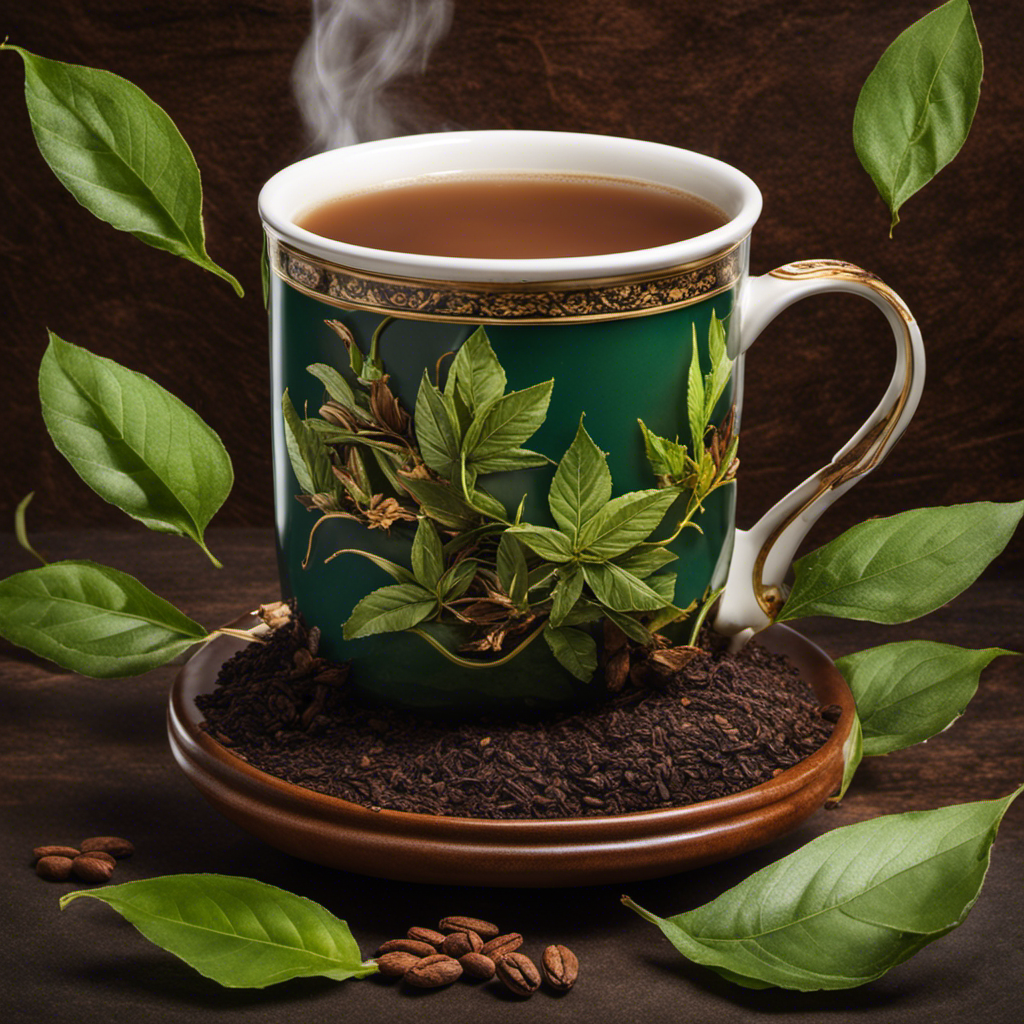
According to the saying, a morning lacking coffee is comparable to a sunless sky. However, what if I informed you that there are alternative methods to obtain that essential caffeine boost?
In this article, I’ll explore the world of coffee substitutes that still pack a punch. From the invigorating effects of yerba mate to the rich flavor of chicory coffee, we’ll uncover the best alternatives to satisfy your caffeine cravings.
So sit back, relax, and get ready to discover a whole new world of stimulating beverages.
Key Takeaways
- Green tea and black tea are good substitutes for coffee that provide a caffeine kick without the jitters or crash.
- Yerba mate and guayusa are traditional South American beverages that offer natural and sustained energy boosts without the negative effects of caffeine.
- Matcha is a coffee alternative that provides a smoother and more sustained energy boost, along with potential health benefits.
- Roasted dandelion root is a caffeine-free alternative to coffee that has a rich flavor and benefits liver health and digestion.
The Benefits of Tea as a Coffee Substitute
Tea’s many benefits make it a great substitute for coffee.
Green tea, in particular, is known for its numerous health benefits. It contains antioxidants called catechins, which have been shown to reduce the risk of heart disease and certain types of cancer. Green tea also contains caffeine, which provides a gentle energy boost without the jitters or crash often associated with coffee.
Additionally, there are many other types of tea that can be enjoyed as a coffee alternative.
Black tea, for example, is known for its bold flavor and is a popular choice for those seeking a stronger caffeine kick.
Herbal teas, on the other hand, are naturally caffeine-free and offer a wide range of flavors and health benefits.
With so many options to choose from, tea is a versatile and healthy alternative to coffee.
Exploring the Energizing Effects of Yerba Mate
If you’re looking for a pick-me-up without the jitters, yerba mate could be a great option for you. Yerba mate is a traditional South American drink made from the leaves of the yerba mate plant. It has a rich history dating back centuries and is known for its energizing effects.
To brew yerba mate, there are several different methods you can try. The most traditional method is using a gourd and bombilla, which is a special cup and straw. This allows you to steep the mate leaves in hot water and drink directly from the gourd. Another popular method is using a French press, where you steep the leaves in hot water and then press down the plunger to separate the leaves from the liquid. Lastly, you can also find yerba mate in tea bag form, which is convenient for on-the-go brewing.
| Method | Description | Pros |
|---|---|---|
| Gourd and Bombilla | Traditional method, enhances the flavor | Rich taste, cultural experience |
| French Press | Easy to use, convenient | Quick brewing process |
| Tea Bags | Portable, easy to use | Convenient for on-the-go |
Uncovering the Natural Buzz of Guayusa
When you’re seeking a natural energy boost, guayusa may be just what you need. This traditional Amazonian beverage has been consumed for centuries by indigenous communities in the Amazon rainforest.
Guayusa is known for its rich caffeine content, which provides a natural and sustained energy boost without the jitters or crash commonly associated with coffee. Unlike coffee, guayusa contains a unique combination of caffeine, antioxidants, and amino acids that work together to promote mental clarity, focus, and alertness.
Additionally, guayusa is a great alternative for those looking to reduce their coffee intake, as it has a smooth and earthy flavor that can be enjoyed hot or cold.
The Invigorating Powers of Matcha
I’ve always been a coffee lover, but recently I’ve been hearing a lot about matcha and its health benefits.
I decided to delve into the world of matcha and compare it to coffee in terms of taste, caffeine content, and overall health benefits.
After doing some research, I discovered that matcha not only provides a smoother and more sustained energy boost compared to coffee, but it is also packed with antioxidants and has been linked to numerous health benefits such as improved focus and metabolism.
Matcha Versus Coffee
You can compare matcha and coffee to see which one provides a better caffeine boost. When it comes to matcha, it offers a unique set of benefits that make it a popular choice among health enthusiasts. Here are some reasons why matcha might be the better option:
- Matcha is rich in antioxidants, which help fight free radicals in the body.
- Matcha provides a more sustained energy boost than coffee, thanks to its combination of caffeine and L-theanine.
- Matcha has been linked to improved focus and concentration, without the jitters or crash often associated with coffee.
- Matcha can be used in a variety of recipes, from smoothies to desserts, making it a versatile ingredient.
- Matcha lattes, in particular, are known for their creamy, earthy flavor and potential health benefits.
With all these advantages, it’s worth giving matcha a try as an alternative to coffee.
Health Benefits of Matcha
Matcha is known for its rich antioxidants, which contribute to its potential health benefits. One of the benefits of matcha that is often talked about is its potential for weight loss. Some studies suggest that matcha can help boost metabolism and burn fat.
Additionally, matcha has been praised for its detoxifying properties. It is said to help eliminate toxins from the body, thanks to its high levels of chlorophyll. This makes matcha a natural detoxifier that can support overall wellness.
So, if you’re looking for a beverage that not only provides a caffeine boost but also offers potential benefits for weight loss and detoxification, matcha may be a good choice.
Speaking of coffee alternatives, another surprising option is roasted dandelion root, which I will discuss in the next section.
Roasted Dandelion Root: A Surprising Coffee Alternative
Roasted dandelion root is a surprisingly effective alternative to coffee for those seeking a caffeine boost. As someone who enjoys a cup of coffee in the morning, I was skeptical about trying dandelion root as a substitute. However, I was pleasantly surprised by its taste and the health benefits it offers.
Here are some reasons why roasted dandelion root is worth considering:
- It has a rich and robust flavor, similar to coffee but with a slightly nutty undertone.
- Dandelion root is known to support liver health and aid digestion.
- It is packed with antioxidants, which can help reduce inflammation in the body.
- Unlike coffee, dandelion root does not cause jitters or an energy crash.
- It is caffeine-free and can be enjoyed at any time of the day without disrupting sleep.
Overall, roasted dandelion root is a delicious and healthy alternative to coffee, offering a caffeine boost without the negative side effects. Give it a try and see if it becomes your new morning ritual!
Harnessing the Energy of Ginseng for a Caffeine Boost
Ginseng, a popular energy booster, can be harnessed for a caffeine-free alternative to coffee.
Ginseng is a root that has been used for centuries in traditional medicine for its various health benefits. It is known to improve energy levels, boost mental clarity, and enhance physical performance. The energy boost provided by ginseng is believed to be due to its adaptogenic properties, which help the body adapt to stress and increase overall resilience.
Additionally, ginseng is rich in antioxidants, which can help protect the body against free radicals and reduce inflammation. While ginseng does not contain caffeine like coffee, it can still provide a natural energy boost without the jitters or crashes associated with caffeine consumption.
To further enhance the energy-boosting effects, combining ginseng with other natural stimulants like Yerba Mate can provide even more benefits. Yerba Mate is a traditional South American drink that contains caffeine and other compounds that promote focus, alertness, and mental clarity.
Together, ginseng and Yerba Mate can offer a potent and caffeine-free alternative to coffee for those looking for an energy boost.
Discovering the Rich Flavor of Chicory Coffee
I’ve always been curious about the health benefits of chicory and how it compares to coffee in terms of taste.
Chicory is known to have numerous health benefits, such as aiding in digestion, reducing inflammation, and promoting liver health.
In terms of taste, some people describe chicory coffee as having a rich and slightly nutty flavor, while others find it to be a good alternative to coffee due to its similar bitterness.
Health Benefits of Chicory
Chicory is known for its various health benefits, making it a popular substitute for coffee. Not only does it provide a rich and robust flavor, but it also offers several advantages for your well-being.
Here are the health benefits of chicory:
-
Digestive Health: Chicory contains inulin, a prebiotic fiber that promotes healthy gut bacteria and improves digestion.
-
Liver Health: Research suggests that chicory can protect the liver from damage caused by oxidative stress and toxins.
-
Anti-Inflammatory Properties: The polyphenols in chicory have anti-inflammatory effects, which may help reduce inflammation in the body.
-
Blood Sugar Control: Studies have shown that chicory can help regulate blood sugar levels, making it beneficial for individuals with diabetes.
-
Antioxidant Power: Chicory is rich in antioxidants, which help combat harmful free radicals and protect cells from damage.
When it comes to taste, chicory has a slightly bitter and nutty flavor compared to coffee. However, when mixed with coffee or used as a coffee substitute, chicory can add depth and complexity to the taste profile.
Taste Comparison With Coffee
If you’re looking for a different flavor profile, you’ll find that chicory has a slightly bitter and nutty taste compared to coffee. While coffee is known for its rich and bold flavor, chicory offers a unique taste that some may prefer.
The bitterness of chicory can be a refreshing change for those who enjoy a more robust and complex flavor. Additionally, the nuttiness adds depth and a subtle earthy note to the overall taste.
Flavor preferences vary from person to person, so it’s important to try both coffee and chicory to determine which one suits your taste buds best. Some may find the bitterness of chicory too strong, while others may appreciate its distinct flavor.
Ultimately, the choice between coffee and chicory comes down to individual taste preferences.
Cocoa: A Deliciously Stimulating Coffee Substitute
You can try cocoa as a deliciously stimulating substitute for coffee that still provides caffeine. Cocoa is not only a comforting and indulgent beverage, but it also offers several health benefits.
Here are some reasons why cocoa is a great alternative to coffee:
-
Rich in antioxidants: Cocoa is packed with powerful antioxidants known as flavonoids, which can help reduce inflammation and protect against chronic diseases.
-
Mood booster: Cocoa contains compounds that can enhance mood and promote feelings of happiness and relaxation.
-
Heart health: Research suggests that consuming cocoa may improve cardiovascular health by reducing blood pressure and improving blood flow.
-
Brain function: Cocoa has been found to enhance cognitive function and improve memory and focus.
-
Versatile ingredient: Cocoa can be used in various recipes, from hot chocolate and smoothies to baked goods and desserts.
Incorporating cocoa into your daily routine not only satisfies your caffeine cravings but also provides numerous health benefits.
The Aromatic Delights of Chai Tea
After exploring the stimulating properties of cocoa as a coffee substitute, let’s delve into the aromatic delights of chai tea.
Chai tea is a flavorful and invigorating alternative that can provide a caffeine boost without the jitters. This traditional Indian beverage is a blend of black tea, aromatic spices, and milk. The flavors of chai tea can vary depending on the spices used, which often include cardamom, cinnamon, ginger, cloves, and black pepper.
Brewing techniques for chai tea also differ, with some recipes calling for simmering the tea and spices in water, while others recommend steeping them together. Experimenting with different brewing methods and spice combinations allows you to customize your chai tea experience to suit your taste preferences.
Frequently Asked Questions
How Much Caffeine Does Tea Contain Compared to Coffee?
Tea contains less caffeine compared to coffee. Black tea typically has around 40-70 milligrams of caffeine per 8-ounce cup, while green tea usually contains 20-45 milligrams.
What Are the Health Benefits of Yerba Mate?
Yerba mate is a traditional South American beverage with numerous health benefits. It is known for its cultural significance and rich antioxidants. It can be a good substitute for coffee, providing a boost of caffeine.
How Does Guayusa Provide Natural Energy?
Guayusa provides natural energy through its high caffeine content and other beneficial compounds. It can be a good substitute for coffee as it offers a similar stimulating effect without the jitters or crashes often associated with coffee consumption.
What Are the Differences Between Matcha and Traditional Green Tea?
Matcha, a ceremonial tea, is prepared by whisking powdered green tea leaves. The process creates a vibrant, frothy beverage. Matcha contains caffeine, making it a good substitute for coffee.
How Does Ginseng Provide a Caffeine Boost?
Ginseng benefits include providing a caffeine boost. It can be a good substitute for coffee as it has similar stimulating effects. However, it’s important to note that the caffeine content in ginseng may vary.
Conclusion
In conclusion, while coffee may be the go-to caffeine source for many, there are plenty of alternatives that can provide a similar energy boost. Tea, yerba mate, guayusa, matcha, roasted dandelion root, ginseng, chicory coffee, and cocoa all offer their own unique flavors and benefits.
So, whether you’re looking to reduce your coffee intake or just want to try something new, these options are worth exploring. Remember, the key is to find what works best for you and enjoy the journey of discovering new and invigorating beverages.
Arf, an author and an innovative enthusiast of coffee, coffee alternatives, and tea, plays a crucial role as a contributor to the esteemed Cappuccino Oracle platform. Renowned for his curiosity and passion for these captivating beverages, Arf has carved out a unique space for himself in the world of exploration and writing. He realized that coffee, coffee alternatives, and tea are not mere drinks to keep one awake, but universes of flavors and stories waiting to be explored.
Arf’s articles for Cappuccino Oracle blend meticulous research with personal experiences, providing readers with an in-depth understanding of various types of coffee, coffee alternatives, and tea, along with their unique characteristics, cultures, and histories. His honest reviews and engaging narratives guide readers on their own journeys, helping them discover their preferences and find their perfect brew.
Coffee Alternatives And Tea
You’ve Been Brewing Tea Wrong Your Whole Life
Optimize your tea brewing techniques to unlock hidden flavors; discover the surprising factors that could transform your daily cup into a delightful experience.
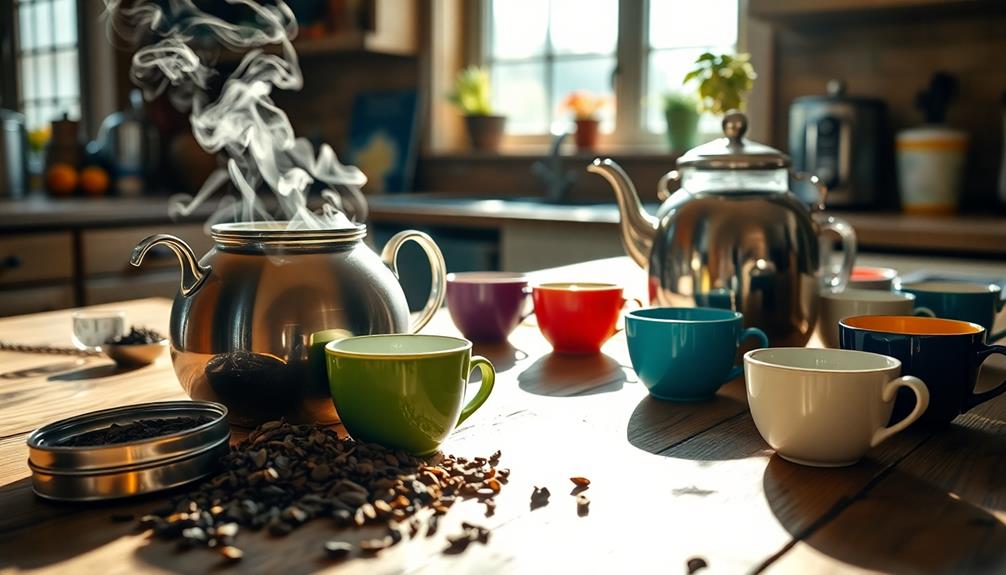
You've been brewing tea wrong, and it's time to change that. First, consider using loose leaf tea instead of cheap tea bags for a richer flavor. Steep black tea for four to five minutes to maximize its benefits. Your brewing vessel matters too; a porcelain teapot retains heat better. Using filtered water enhances the taste, while mug color can influence how sweet your tea tastes. Finally, experiment with additives like milk, lemon, or spices to elevate your experience. If you want to grasp all the nuances of tea brewing, there's much more waiting for you.
Key Takeaways
- Always use whole leaf tea instead of tea bags for a richer flavor and aroma experience.
- Steep black tea for four to five minutes to fully extract optimal flavor and health benefits.
- Use filtered water to enhance taste and avoid hard minerals that can alter flavor profiles.
- Choose a porcelain teapot for better heat retention, crucial for effective loose leaf tea brewing.
- Add milk, sugar, or spices after steeping to enhance flavor without overpowering the tea's natural taste.
Importance of Quality Ingredients
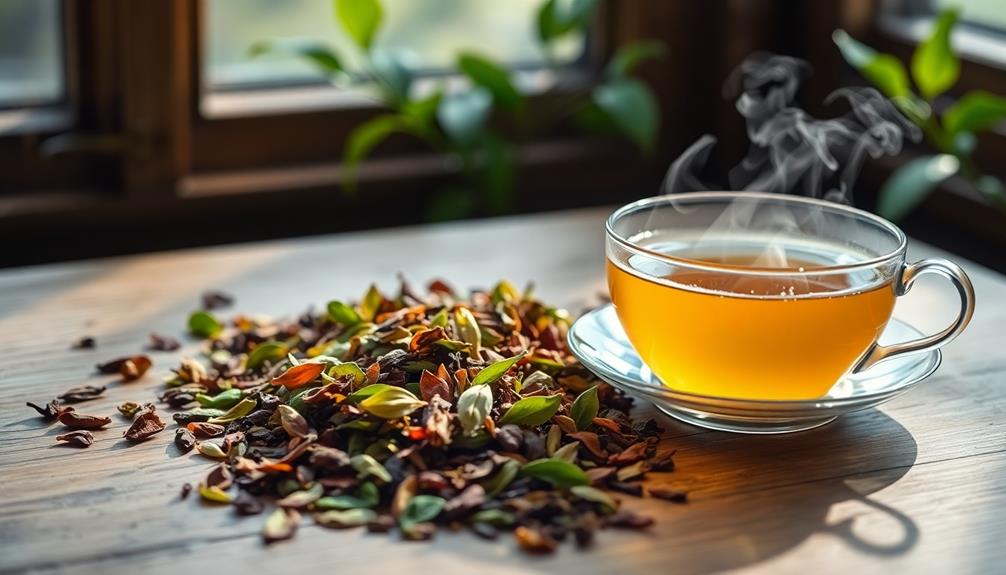
When it comes to brewing the perfect cup of tea, the quality of your ingredients can make all the difference. While 96% of tea drinkers rely on tea bags, you might want to take into account loose leaf tea for its superior flavor and aroma. Whole leaves retain essential oils that enhance the taste, giving you a richer experience.
Brands like Yorkshire Tea stress the significance of using quality ingredients and proper brewing techniques to elevate your tea. Additionally, the environment where you brew can impact your tea's quality; for instance, guaranteeing clean and well-maintained equipment can prevent contamination and enhance flavor, similar to how air purifiers need regular maintenance.
Water quality is equally crucial. Using filtered water instead of tap water can dramatically improve your tea's taste by removing hard minerals that create scum and alter flavor profiles. The right type of water will guarantee that the flavors of your tea bags or loose leaf tea shine through.
Don't underestimate the impact of your mug either! Studies show that the color of your mug can influence your perception of sweetness, adding another layer to your tea experience.
The Art of Steeping Tea
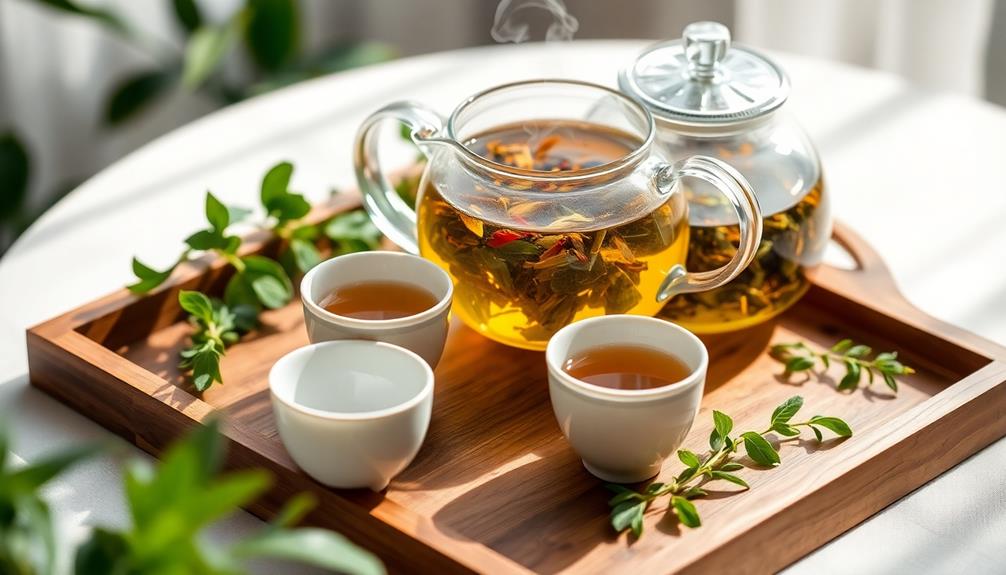
Steeping tea is an essential step in crafting a flavorful cup, and getting it right can transform your experience. For most black teas, like Yorkshire Tea, aim for a steeping time of four to five minutes. This window allows for maximum flavor extraction without introducing bitterness. If you steep longer, you might notice an increase in caffeine and antioxidants, with levels rising from about 35 mg to 50 mg.
Additionally, herbal teas, particularly those with ingredients like turmeric and ginger, can offer health benefits for fibromyalgia while you enjoy your brew.
Proper steeping greatly influences taste. If you don't steep long enough, you'll end up with a bland cup that tastes more like hot water than the rich flavor you crave. It's also important to reflect on your water quality. Using filtered water can markedly enhance your tea's flavor by minimizing the negative effects of hard water, which can create scum and interfere with flavor compounds.
After steeping, you can personalize your experience by gently squeezing the tea bag, helping to release more flavor. Just be cautious—too much squeezing can lead to bitterness.
Mastering the art of steeping not only elevates your tea-drinking experience but also maximizes its health benefits, making each cup a delightful ritual.
Choosing the Right Vessel
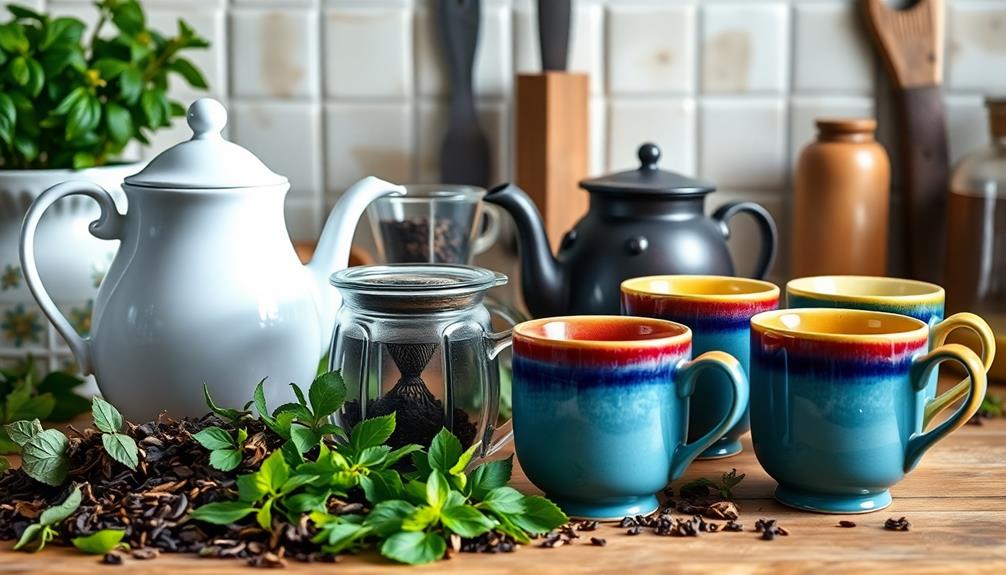
Selecting the right vessel for your tea can greatly enhance your drinking experience. Using a porcelain teapot is a fantastic choice for brewing loose leaf tea, as it retains heat better than other materials, ensuring ideal steeping. This heat retention is essential for flavor extraction, allowing your tea to reach its full potential.
Additionally, the right vessel can help maintain air quality, which is important since certain materials can impact how flavors are perceived. For instance, air quality considerations can improve your overall tea enjoyment by reducing unwanted odors.
On the other hand, be cautious with your mugs. Research shows that the color and material can impact your perception of flavor. For instance, red mugs can enhance the perception of sweetness, while Styrofoam cups can negatively affect flavor absorption. Their insulating properties can lead to a less enjoyable tea experience, so it's best to avoid them.
Furthermore, the material of your drinking vessel influences thermal properties, which play a significant role in how your tea brews. Using a poor-quality vessel can hinder the steeping process, ultimately affecting the flavor you savor.
Enhancing Flavor With Additives
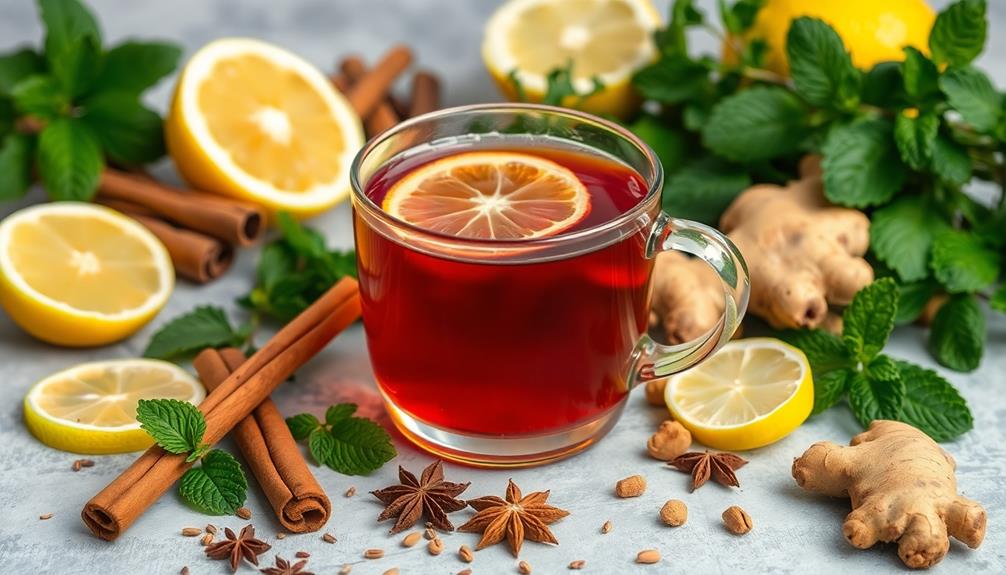
Elevate your tea experience by exploring various additives that can enhance flavor and create a more enjoyable brew. Many of us have been making tea wrong by overlooking these simple yet effective ingredients.
For instance, adding a splash of milk can introduce creaminess and balance out the tannins in your cup, but remember to add it after steeping to prevent scalding the tea. Additionally, consider pairing your tea with a cleaner indoor environment; using an air purifier can greatly improve your overall well-being while enjoying your beverage, as it helps reduce allergens and enhances air quality air quality benefits.
If you prefer a touch of sweetness, consider a teaspoon of sugar or honey. Just be cautious—not to overpower the delicate flavors of the tea.
Lemon is another popular additive; it adds a zesty flavor while boosting vitamin C, making your tea more invigorating.
Don't stop there—experiment with spices like cinnamon or cardamom, which can introduce unique flavor profiles, especially in black teas. This not only enriches the overall experience but also makes your cup truly your own.
Lastly, gently squeeze the teabag after steeping to intensify the flavor, but don't overdo it; this can lead to bitterness.
With these additives, you'll transform your tea-drinking ritual and never look back!
Unlocking Health Benefits of Tea
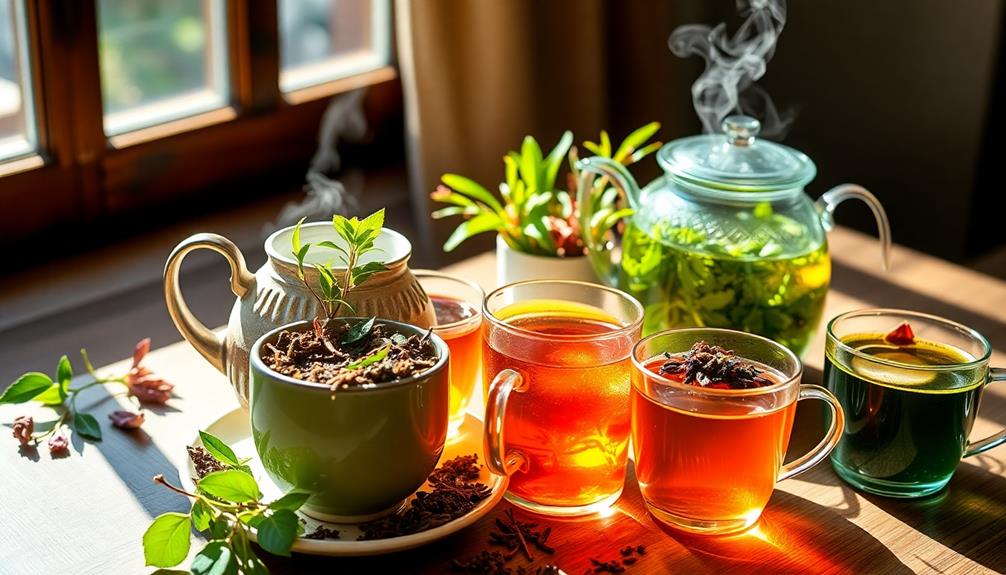
Enhancing your tea's flavor with additives is just the beginning; the way you brew it can reveal a treasure trove of health benefits. To truly access these benefits, aim to steep your tea for five minutes. This duration markedly boosts antioxidant levels, which can aid in disease prevention and overall wellness, particularly with varieties like oolong tea, known for its rich polyphenols and health-promoting properties its unique flavor profile.
Here are three top tips for maximizing those health benefits:
First, always use filtered water. The quality of water impacts flavor and extraction of beneficial compounds.
Second, be mindful of the amount of caffeine. While a longer brew time increases caffeine content, it can also enhance alertness and focus.
Frequently Asked Questions
Can I Reuse Loose Leaf Tea for Multiple Brews?
Yes, you can definitely reuse loose leaf tea for multiple brews! Just remember to adjust the steeping time and temperature for each infusion, as flavors will vary with each subsequent brew. Enjoy your tea!
How Do I Properly Store Loose Leaf Tea?
Storing loose leaf tea is like tucking away a treasure. Keep it in an airtight container, away from light and moisture. You'll preserve its flavor and freshness, ensuring every brew delights your senses anew.
What Is the Best Water Temperature for Different Tea Types?
For ideal flavor, steep black tea at 200°F, green tea at 175°F, oolong at 190°F, and white tea around 160°F. Adjusting water temperature enhances your brewing experience and brings out each tea's unique qualities.
Are There Specific Teas That Are Better for Morning Versus Evening?
Certain teas suit different times. In the morning, opt for energizing black or green teas. For evening, choose calming herbal blends like chamomile or peppermint, which help you relax and prepare for restful sleep.
How Can I Tell if My Tea Has Expired?
You might wonder if your tea's still good. Check for an off smell, faded color, or unusual texture. If it's lost its aroma or flavor, it's time to say goodbye and replace it.
Conclusion
In the garden of tea, you've tended to weeds instead of nurturing the blossoms. By embracing quality ingredients and mastering the steeping process, you're cultivating a richer experience. Choosing the right vessel is like selecting the perfect sun for your blooms. As you sprinkle in flavors and uncover health benefits, you're painting a vibrant landscape of well-being. So, let your brewing journey flourish—each cup is a step toward the lush paradise of true tea appreciation.
In the vast and diverse world of coffee, coffee alternatives, and tea, Olivia has found her calling. As an author and a dedicated coffee and tea aficionado, her work for Cappuccino Oracle reflects her profound love and understanding of the intricate complexities found within these beverages. Olivia’s passion for the subject serves as both a catalyst for her creativity and a connection point with her audience.
Olivia’s appreciation for coffee, coffee alternatives, and tea blossomed at an early age. She discovered that these beverages invigorated her senses and stimulated her creative spirit. From the nuanced flavors of single-origin roasts to the captivating narratives intertwined with coffee, coffee alternatives, and tea trade and culture, Olivia found an unlimited source of inspiration in her daily cup.
Her love for these beverages and her talent for storytelling eventually converged at Cappuccino Oracle. As an author, Olivia’s mission is to illuminate the intricate tapestry that makes up the world of coffee, coffee alternatives, and tea. Her articles span a diverse range of topics, encompassing everything from the unique flavors of different brews to the sociocultural history intertwined with their cultivation and consumption.
Coffee Alternatives And Tea
Forget Coffee: 5 Morning Drinks That Will Change Your Life
Wake up your mornings with five transformative drinks that offer surprising health benefits—discover which ones will invigorate your daily routine!
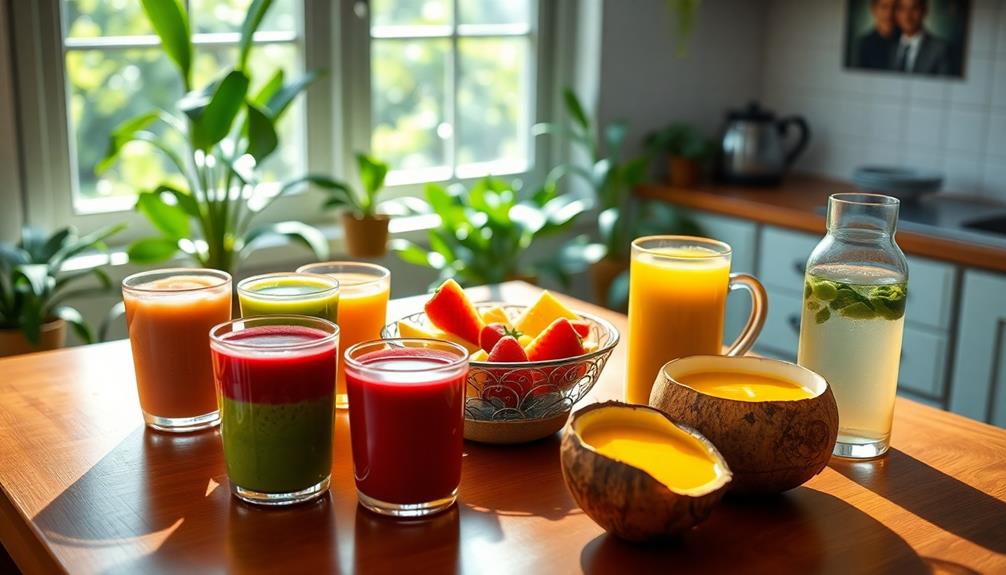
If you're ready to swap coffee for something rejuvenating, consider these five morning beverages to invigorate your routine. Start with matcha for a gentle energy boost packed with antioxidants. Herbal teas offer a soothing, caffeine-free alternative with added health benefits. Smoothies provide a versatile, nutrient-rich option to kickstart your day. For comfort, enjoy golden milk, a cozy turmeric blend loaded with anti-inflammatory properties. Finally, hydrate with lemon water, which supports your immune system and enhances skin health. These drinks can uplift your mornings, and you'll discover even more benefits ahead!
Key Takeaways
- Matcha provides a gentler caffeine boost, rich in antioxidants that enhance metabolism and improve focus through L-Theanine.
- Herbal teas, like peppermint and ginger, are caffeine-free and promote digestive health while offering soothing wellness benefits.
- Smoothies are customizable nutrient-packed blends of fruits and vegetables, providing essential vitamins and fiber for sustained energy throughout the day.
- Golden milk, made with turmeric and ginger, offers anti-inflammatory benefits and serves as a comforting morning ritual for relaxation.
- Hydrating lemon water boosts vitamin C intake, enhances hydration, and supports skin health, making it a refreshing start to the day.
Matcha: The Energizing Powerhouse
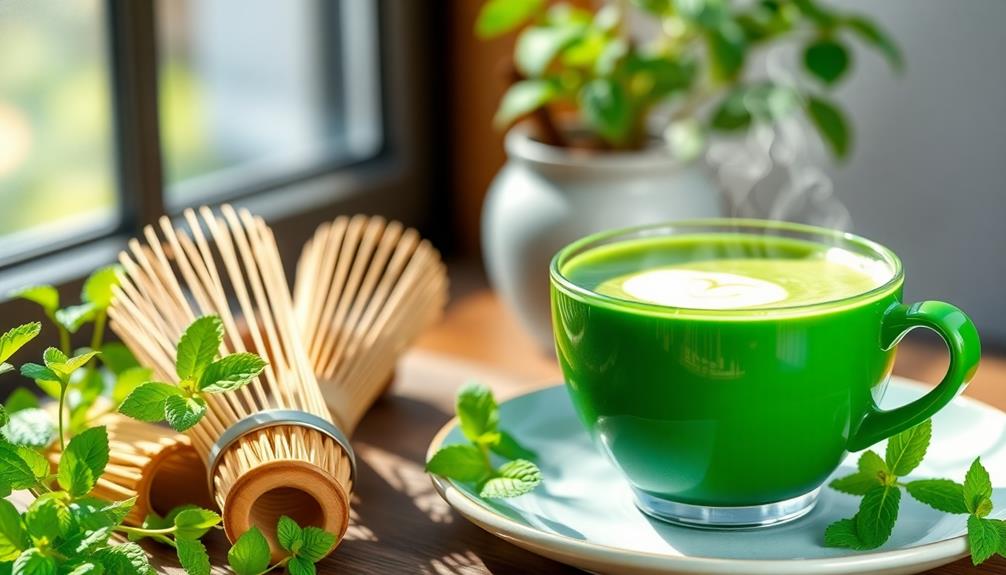
In the morning, you might crave a drink that not only wakes you up but also fuels your body. Enter matcha—an energizing alternative to coffee that packs a punch with about 48 mg of caffeine per 8-oz serving. This gentler energy boost helps you stay alert without the jitters often associated with traditional caffeine sources.
Additionally, incorporating essential oils such as lemon or peppermint into your morning routine can enhance your overall wellness and provide natural energy support through their invigorating aromas unlock aromatic cleaning power.
Matcha's vibrant green color and unique flavor can easily become a favorite in your morning routine. You can enjoy it as a latte with your choice of milk or simply whisk it into hot water.
Beyond its taste, matcha is rich in antioxidants, particularly catechins, which support your metabolism and may enhance fat burning.
The presence of L-Theanine in matcha promotes a calm yet alert state, improving your focus and productivity throughout the day. Regular consumption of this superfood has been linked to impressive health benefits, including reduced risks of certain cancers, heart disease, and type 2 diabetes.
Herbal Teas for Wellness
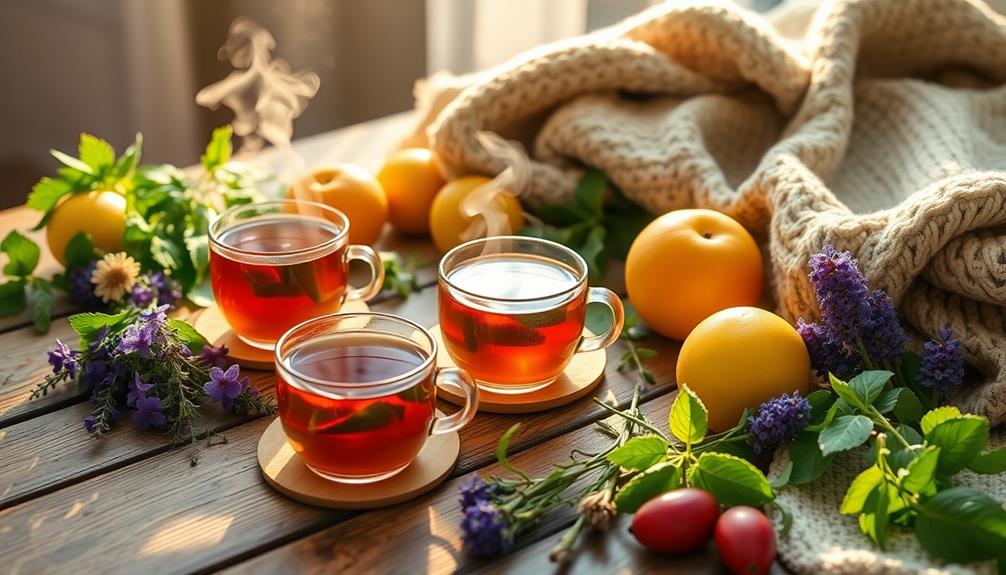
Herbal teas offer a delightful and healthful way to enhance your morning routine. These caffeine-free beverages not only provide a soothing start to your day but also come packed with antioxidants and essential minerals. Incorporating a variety of herbal teas can greatly contribute to your overall wellness.
| Herbal Tea | Benefits | Key Ingredients |
|---|---|---|
| Peppermint Tea | Aids digestion, soothes bloating | Peppermint leaves |
| Rooibos | Rich in antioxidants and minerals | Rooibos plant |
| Ginger Tea | Anti-inflammatory, aids digestion | Fresh ginger root |
Peppermint tea is especially known for its ability to soothe digestive discomfort, making it a great choice if you often experience bloating. Rooibos, on the other hand, is loaded with minerals like calcium and magnesium, promoting hydration and immune health. Ginger tea boasts anti-inflammatory properties, helping alleviate muscle pain and support skin health.
Smoothies: Nutrient-Packed Start
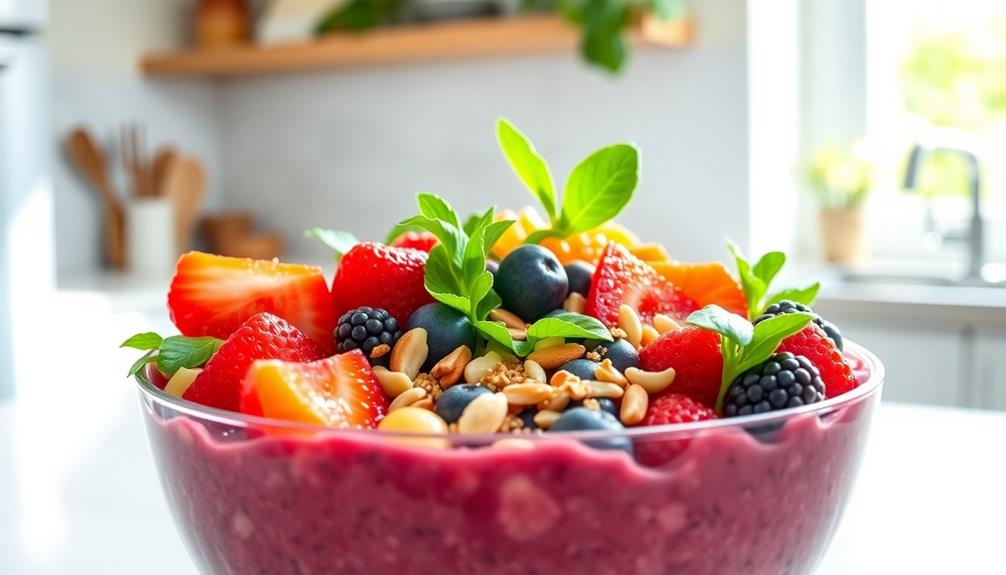
Starting your day with a nutrient-packed smoothie can be a game changer for your morning routine. Smoothies allow you to customize a blend of fruits and vegetables, delivering essential vitamins, minerals, and fiber to kickstart your day.
By adding protein sources like yogurt or nut butter, you enhance satiety, making smoothies a satisfying meal replacement for breakfast. Incorporating lean proteins and high-fiber ingredients, like low carb high protein options, can further boost your energy levels and keep you feeling full longer.
Incorporating ingredients like spinach or kale boosts the antioxidant content, supporting your overall health and aiding in detoxification. The high fiber in smoothies helps stabilize blood sugar levels, preventing those energy crashes that often follow caffeine consumption.
You'll find that maintaining balanced energy levels throughout the morning becomes much easier.
One of the best things about smoothies is their convenience. With just a few minutes of prep and a quick blend, you can enjoy a nutritious drink that fits perfectly into your busy schedule.
Whether you're rushing out the door or enjoying a slow morning, a smoothie can be your go-to option. So, grab your blender, throw in your favorite ingredients, and start your day off right with a delicious, nutrient-packed smoothie!
Golden Milk: Comfort in a Cup
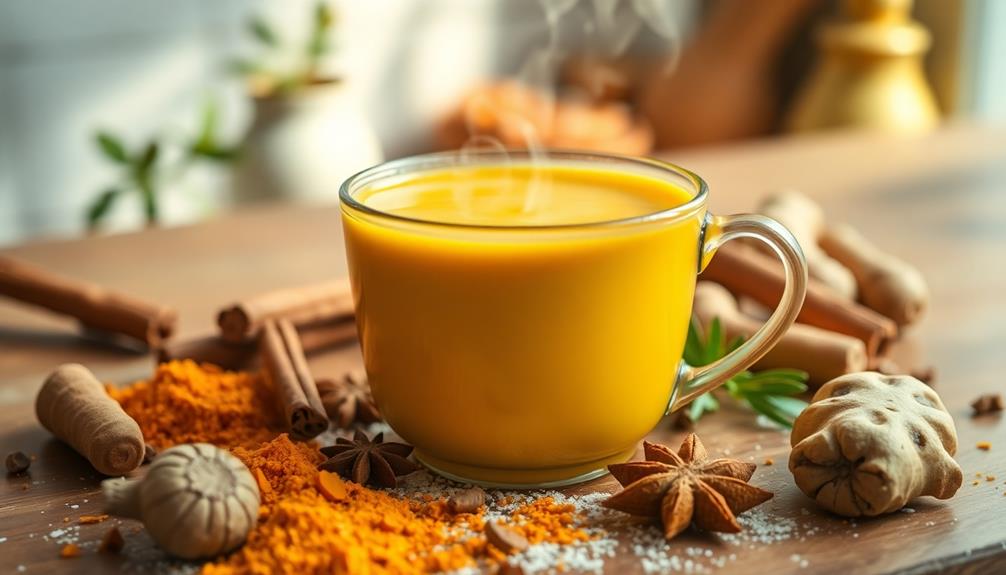
There's something undeniably comforting about curling up with a warm cup of golden milk in the morning. This turmeric latte, made with turmeric, ginger, and your choice of dairy or plant-based milk, offers a soothing alternative to traditional coffee.
Packed with anti-inflammatory properties thanks to curcumin in turmeric, golden milk is a delightful way to start your day on a nourishing note. Additionally, incorporating chia seeds into your diet can further enhance digestive health, offering a rich source of dietary fiber that promotes regularity.
Simply simmer 1 teaspoon of turmeric with ½ cup of milk and add spices like cinnamon or ginger for an extra flavor boost. You can sweeten it with honey or maple syrup, making it a delicious, caffeine-free drink that supports your well-being.
In addition to being a warm drink that wraps you in comfort, golden milk promotes digestive health and relaxation, setting the tone for a productive day ahead.
With its rich antioxidants, this comforting beverage not only tastes great but also nourishes your body. So why not swap out your morning coffee for this comforting cup? Golden milk is more than just a drink; it's a ritual that can transform your morning routine into a mindful experience.
Hydrating Lemon Water

After enjoying the comforting richness of golden milk, you might be ready to rejuvenate your morning ritual with hydrating lemon water. This simple drink, made by squeezing half a lemon into an 8 oz glass of water, isn't only invigorating but also packs a punch with vitamin C, boasting only about six calories.
The antioxidants in lemon water support your immune system and aid digestion, making it a smart choice to kickstart your day. Additionally, incorporating herbal teas, which are often rich in antioxidants, can further enhance your morning routine and promote overall wellness health benefits of herbal tea.
Drinking lemon water first thing in the morning enhances hydration levels after a night's sleep, promoting better overall health and energy. You'll also love its versatility—enjoy lemon water hot or cold, depending on your mood.
The benefits extend beyond hydration; regular consumption may improve your skin health by flushing out toxins, helping you achieve a clearer complexion.
Incorporating hydrating lemon water into your morning routine can elevate your wellness journey. So, grab that lemon and start your day with a drink that not only quenches your thirst but also nourishes your body inside and out!
Frequently Asked Questions
What Can I Drink Every Morning Instead of Coffee?
You can try matcha tea for a smooth energy boost, or sip lemon water for hydration. Turmeric latte offers anti-inflammatory benefits, while chicory coffee mimics flavor without caffeine. Yerba mate enhances focus and immunity, too.
What Is the Healthiest Drink to Have First Thing in the Morning?
Imagine a revitalizing glass of lemon water, its citrusy aroma awakening your senses. Starting your day with this vibrant drink hydrates you, boosts vitamin C, and kickstarts digestion, making it one of the healthiest morning choices.
What Is a Good Replacement for Coffee in the Morning?
If you're looking for a good coffee replacement in the morning, try matcha tea for its gentle caffeine boost, or lemon water for hydration. Both options energize you while offering additional health benefits without the jitters.
What Is the Morning Ritual to Replace Coffee?
Switching up your morning ritual can spark splendid sensations! Consider sipping a soothing turmeric latte, revitalizing lemon water, or vibrant matcha. Each drink delivers delightful benefits, energizing your day without relying on coffee's kick.
Conclusion
So, why stick with boring old coffee when you can sip your way to enlightenment? Switch it up with matcha that'll have you feeling like a zen warrior, or herbal teas that promise wellness, even if they can't fix your Netflix addiction. Smoothies can make you feel like a health guru, while golden milk might just make you the coziest person in town. And let's not forget hydrating lemon water—it's basically a spa day in a glass! Cheers to upgrading your mornings!
In the vast and diverse world of coffee, coffee alternatives, and tea, Olivia has found her calling. As an author and a dedicated coffee and tea aficionado, her work for Cappuccino Oracle reflects her profound love and understanding of the intricate complexities found within these beverages. Olivia’s passion for the subject serves as both a catalyst for her creativity and a connection point with her audience.
Olivia’s appreciation for coffee, coffee alternatives, and tea blossomed at an early age. She discovered that these beverages invigorated her senses and stimulated her creative spirit. From the nuanced flavors of single-origin roasts to the captivating narratives intertwined with coffee, coffee alternatives, and tea trade and culture, Olivia found an unlimited source of inspiration in her daily cup.
Her love for these beverages and her talent for storytelling eventually converged at Cappuccino Oracle. As an author, Olivia’s mission is to illuminate the intricate tapestry that makes up the world of coffee, coffee alternatives, and tea. Her articles span a diverse range of topics, encompassing everything from the unique flavors of different brews to the sociocultural history intertwined with their cultivation and consumption.
Coffee Alternatives And Tea
This Ancient Tea Is Making Coffee Lovers Switch – Here’s Why
Prepare to discover why this ancient tea is captivating coffee lovers and transforming their daily rituals in unexpected ways.
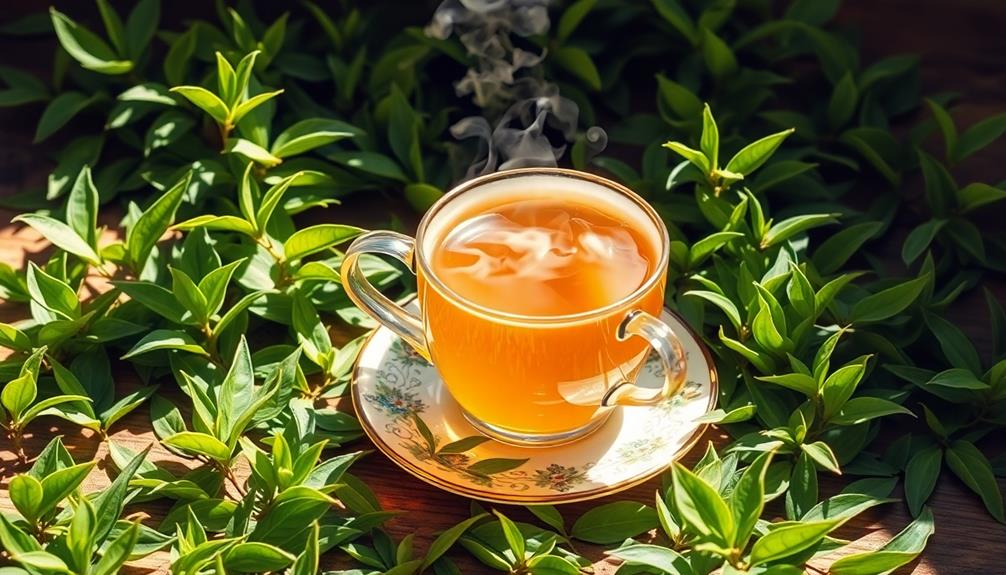
Ancient tea, particularly matcha, is making waves among coffee lovers for good reasons. Its vibrant color and creamy texture offer an exciting change from traditional coffee. With about 70 mg of caffeine per serving, matcha provides a smoother energy boost without the jitters and crashes associated with coffee. Plus, the rich antioxidants and probiotics in matcha support your overall health, aiding digestion and heart wellness. The ritual of preparing matcha adds a mindful touch to your day, elevating the experience. If you're curious about how embracing this ancient tea can enhance your lifestyle, stick around for more insights!
Key Takeaways
- Matcha offers a gentler caffeine boost with about 70 mg per serving, reducing jitters compared to traditional coffee's higher caffeine content.
- Rich in antioxidants and probiotics, matcha promotes gut health and overall wellness, appealing to health-conscious coffee drinkers.
- The unique earthy flavor and creamy texture of matcha provide a refreshing contrast to coffee's bitter taste, attracting new consumers.
- Matcha's vibrant green color and aesthetic appeal enhance social media sharing, making it a trendy alternative for visually-driven coffee lovers.
- Cultural tea rituals promote mindfulness and connection, offering a more enriching experience compared to the fast-paced coffee culture.
The Rise of Ancient Tea
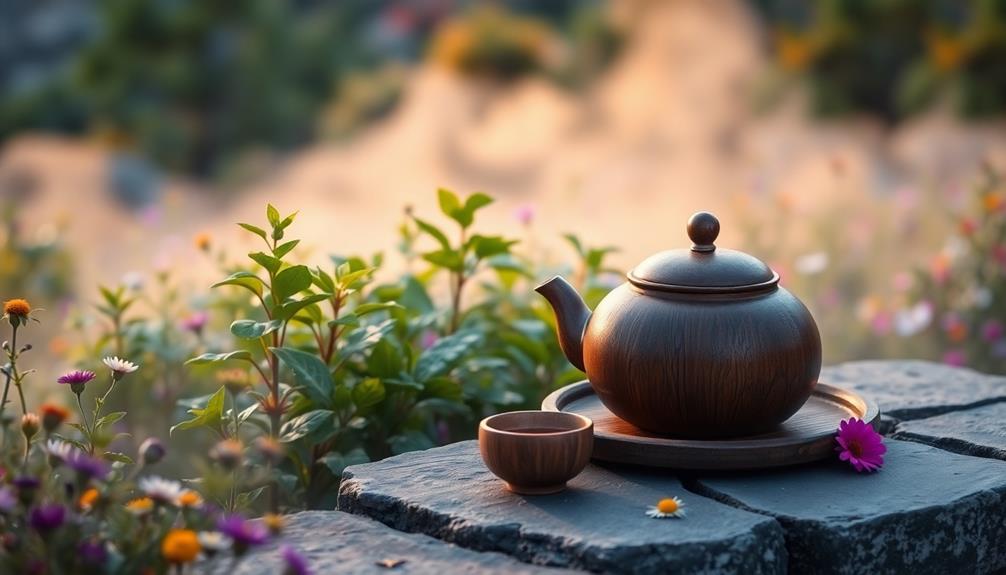
Increasingly, coffee lovers are turning to ancient tea varieties like matcha, captivated by their unique flavors and health benefits. This vibrant green tea offers a rich taste and a wealth of antioxidants, making it an appealing alternative to traditional coffee. As you sip on matcha, you'll notice its smooth, earthy flavor, which stands in stark contrast to the bitterness often associated with coffee.
Additionally, matcha contains probiotics that may aid digestion and gut health, similar to the benefits found in kombucha.
Matcha's popularity is rapidly rising in urban centers, particularly in places like New York City, where dedicated matcha cafes have emerged. These trendy spots not only serve matcha in various forms but also create a ritualistic experience around its preparation. You can delight in the mindful process, reminiscent of Japanese tea ceremonies, which adds a reflective dimension to your drinking experience.
Additionally, matcha is non-acidic, making it a favorable choice if you're aiming to reduce acid reflux that can accompany coffee consumption. Brands like MatchaBar are modernizing matcha drinks, catering specifically to coffee enthusiasts.
With its health benefits and unique preparation, you'll find that matcha isn't just a tea; it's a lifestyle choice that's gaining traction among those seeking a revitalizing alternative.
Comparing Caffeine Content
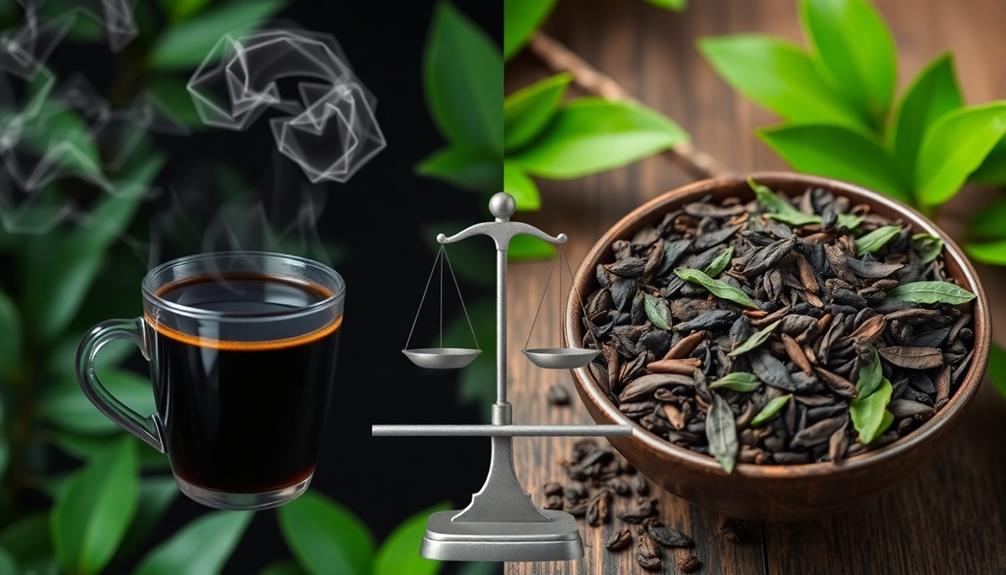
When comparing caffeine content, it's crucial to look at matcha and coffee side by side.
While a typical cup of coffee can pack between 95 to 200 mg of caffeine, matcha usually contains about 70 mg per serving, making it a unique option for those who want a gentler boost.
Additionally, matcha is rich in antioxidants, which can offer various health benefits, including potential weight loss support.
Understanding these differences can help you choose the right drink for your energy needs.
Caffeine Levels in Matcha
Matcha packs a punch when it comes to caffeine content, offering about 60 mg per 3-gram serving—comparable to a standard cup of brewed tea. However, it's crucial to recognize that matcha contains more caffeine than traditional brewed green tea since you consume the whole leaf in powdered form. This means you're getting more of the beneficial compounds, including caffeine.
Additionally, matcha is rich in antioxidants, which can help combat oxidative stress and promote overall well-being, making it a fantastic choice for health-conscious individuals fresh insights on coffee's health benefits.
What sets matcha apart is how the caffeine interacts with other components. The caffeine in matcha is bound to catechins, which allows for a slower release of energy. This results in sustained energy levels without the jitters often associated with coffee.
You'll find that matcha not only helps you stay alert but also promotes relaxation due to the presence of L-theanine, an amino acid that enhances focus and concentration.
Quality matters too; premium matcha typically offers higher caffeine levels. So, if you're looking for a smoother caffeine experience, you might want to give matcha a try. It's a great alternative that delivers both energy and calmness, making it a favorite among those seeking a balanced boost.
Coffee vs. Matcha Caffeine
Caffeine content plays an essential role in choosing your preferred beverage, and comparing coffee to matcha reveals some interesting differences. An average cup of brewed coffee contains around 95 mg of caffeine per 8 oz serving, while matcha typically has about 70 mg. Although matcha has slightly less caffeine, the way it affects your body is quite unique.
Additionally, matcha's benefits extend beyond caffeine, as it's rich in antioxidants that support overall health and well-being, much like the advantages of herbal tea for fibromyalgia.
With matcha, the caffeine is combined with L-theanine, a compound that slows the release of caffeine into your system. This results in sustained energy without the jitters or crashes often associated with coffee. Instead of experiencing a quick spike followed by a dip, matcha provides a more balanced energy level throughout the day.
It's worth noting that the caffeine content in matcha can vary based on the quality of the leaves and how you prepare it. Premium matcha can offer higher caffeine levels, making it an appealing choice for those who still want a caffeine boost.
Ultimately, while both coffee and matcha deliver caffeine from plant sources, the overall experience you get from matcha stands out as a calmer, steadier alternative to coffee.
Health Benefits of Tea
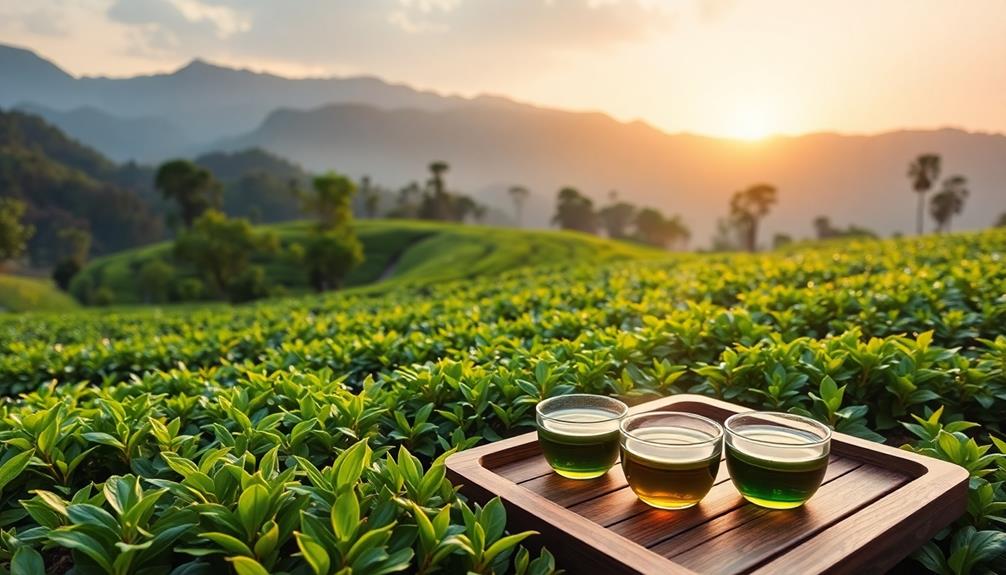
Tea offers a treasure trove of health benefits that can greatly enhance your well-being. The antioxidants found in tea leaves promote heart health and may reduce your risk of chronic diseases. If you're looking to manage your weight, green tea is linked to improved metabolism, making it a smart choice for the health-conscious.
Moreover, tea contains L-theanine, which enhances relaxation and focus, effectively counteracting the jitters often associated with coffee. Studies even suggest that moderate tea consumption might lower your risk of certain conditions, including stroke and Alzheimer's disease.
Here's a quick overview of some health benefits you can enjoy with different types of tea:
| Type of Tea | Key Benefits | Notes |
|---|---|---|
| Green Tea | Weight loss, improved metabolism | High in antioxidants |
| Herbal Tea | Digestive support, anti-inflammatory | Caffeine-free, varies by herbs |
| Black Tea | Heart health, lower cholesterol levels | Rich in flavonoids |
Switching to tea can not only satisfy your taste buds but also contribute positively to your health!
Flavor Profiles and Preferences
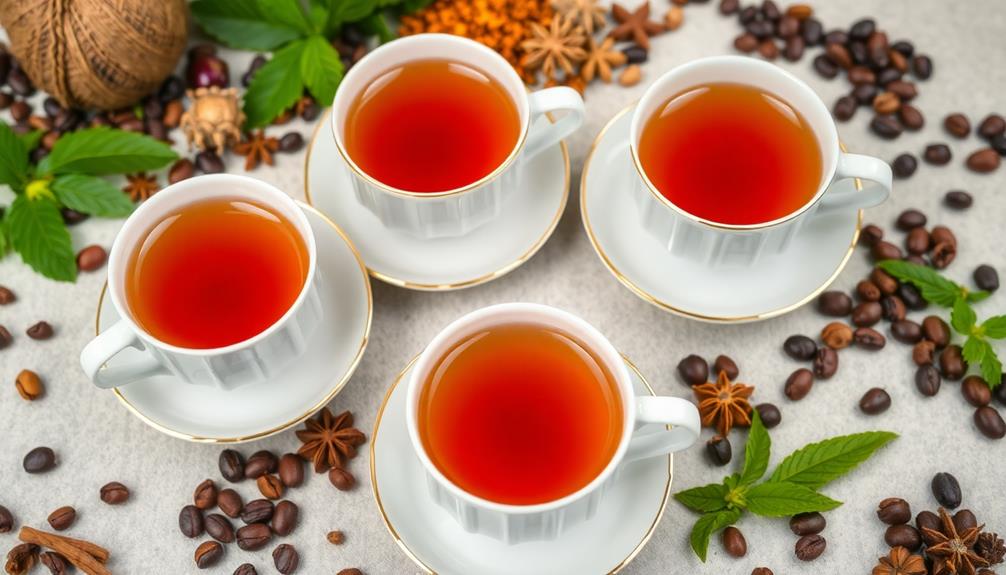
When you compare matcha to coffee, you'll notice distinct taste profiles that can shift your beverage preferences.
The earthy, grassy notes of matcha create a unique aroma and experience that contrasts with coffee's rich, sometimes bitter undertones.
Additionally, incorporating ingredients like chia seeds into your diet can enhance your overall digestive health, as they're known to promote bowel regularity and support gut microbiota promoting digestive health.
Exploring these differences might just enhance your daily routine and open up new flavor horizons.
Distinct Taste Comparisons
Many coffee lovers might be surprised to discover the distinct flavor profiles that matcha offers, standing in stark contrast to their beloved brews. While coffee can range from fruity to chocolatey, matcha presents a unique earthy, slightly sweet taste that many find appealing. Its creamy texture, achieved by whisking powdered tea with water, provides a different mouthfeel compared to the liquid nature of brewed coffee.
Here's a quick comparison to illustrate the differences:
| Aspect | Matcha |
|---|---|
| Flavor Profile | Earthy, slightly sweet |
| Texture | Creamy |
| Caffeine Kick | Moderate |
| Visual Appeal | Vibrant green color |
Though coffee enthusiasts may love the bold flavors and strong caffeine kick, matcha's smooth, less acidic taste and health benefits are increasingly attracting attention. The aesthetics of matcha also enhance the experience, making it a visually pleasing option that many coffee drinkers are keen to explore. As you consider switching, remember that tasting matcha can open up a whole new world of flavors and sensations.
Aroma and Experience
Aromas play an essential role in shaping your experience with beverages, and matcha delivers a sensory journey that's both distinct and inviting. When you whisk matcha powder with hot water, you release a fragrant aroma that's earthy and subtly sweet. This unique umami flavor profile, with its grassy notes, offers a rejuvenating alternative for coffee lovers looking to explore new tastes.
Just as espresso enthusiasts appreciate the rich flavors of coffee, matcha drinkers revel in its complex taste profile, which can be enhanced with stylish presentations in unique mugs for a delightful experience stylish espresso mugs.
The frothy texture of matcha heightens your experience, making each sip feel luxurious compared to traditional coffee. Plus, matcha's vibrant green color not only captivates the eye but also signals its rich antioxidant content, appealing to health-conscious drinkers.
Unlike coffee, matcha provides a more balanced energy boost. The caffeine binds to catechins, resulting in a smooth release of energy without the jitters or crashes you might associate with coffee.
Cultural Significance of Tea

Tea, often considered a cultural cornerstone, has woven itself into the fabric of societies around the world. Its significance transcends mere beverages; it embodies connection, tradition, and mindfulness. From ancient China to modern-day India, tea has shaped cultural practices and social interactions, including the appreciation of various types like oolong tea, which is celebrated for its health benefits and unique flavors.
- In China, tea has been integral to ceremonies and daily life for millennia.
- Japan's traditional tea ceremony highlights mindfulness and artistry, fostering bonds among participants.
- India celebrates tea with chai rituals, emphasizing hospitality and communal sharing.
- Throughout history, emperors and monks have revered tea for its calming properties, enhancing focus and relaxation.
Across various cultures, tea symbolizes hospitality and connection. Each region boasts unique customs surrounding its preparation and consumption, reflecting local traditions and values. For instance, in places like Morocco, mint tea is a sign of welcome, while in Britain, afternoon tea is a cherished social event.
Embracing tea not only introduces you to its flavors but also invites you into a world rich in history and cultural significance.
Preparing the Perfect Brew
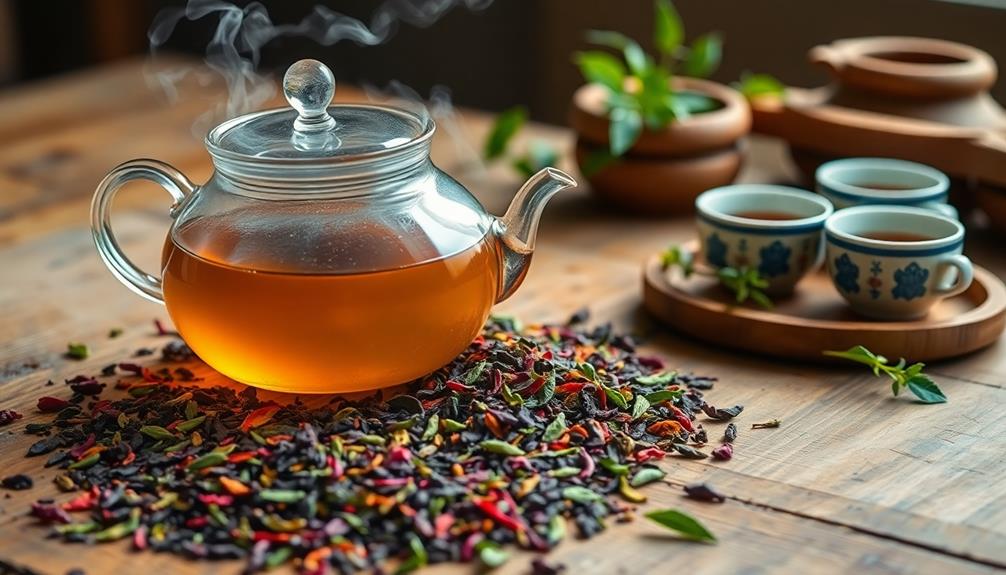
To prepare the perfect brew of matcha, you'll need to gather a few essential tools: a bamboo whisk (chasen), a fine sieve, and a bowl (chawan). These tools help create a delightful experience while preparing matcha, ensuring the powder mixes well with water for a frothy, smooth texture.
Here's a quick guide to help you understand the importance of these tools:
| Tool | Purpose |
|---|---|
| Bamboo Whisk | Whisks matcha powder to create a frothy mix |
| Fine Sieve | Sifts matcha to remove clumps |
| Bowl (Chawan) | Holds the matcha and water for whisking |
When preparing matcha, use 1-2 teaspoons of matcha powder mixed with 2-3 ounces of hot water, ideally at 175°F (80°C). This temperature enhances the flavor without bitterness. Remember, the quality of matcha matters; premium grades deliver a richer taste. Embrace the mindfulness of the traditional Japanese tea ceremony by measuring carefully and whisking with intention. Enjoy the process of preparing matcha as much as the delicious drink itself!
Matcha: A Coffee Alternative
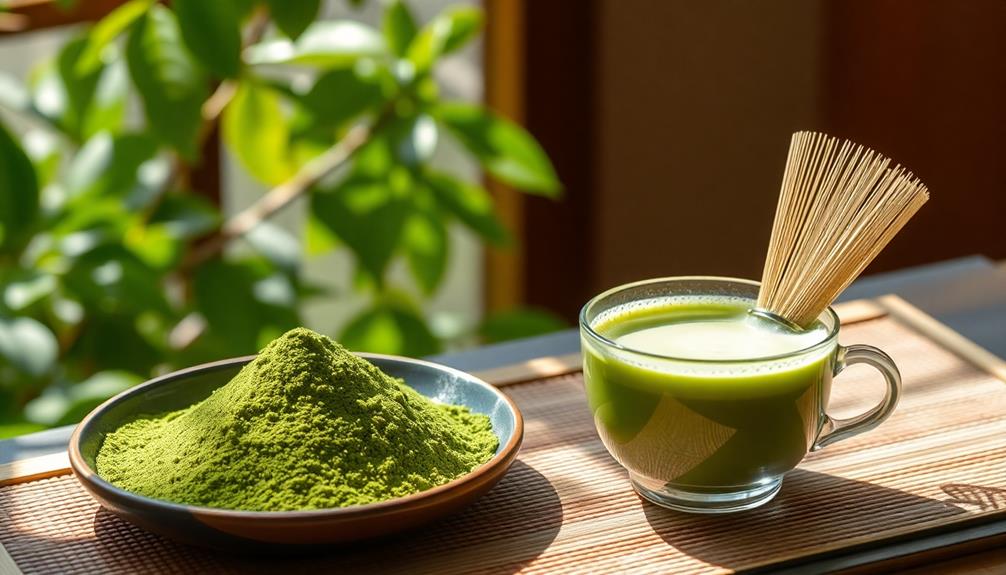
Matcha offers a revitalizing alternative to coffee, especially for those seeking a smoother energy boost. Unlike coffee, matcha contains caffeine that binds to catechins, providing sustained energy without the jitters. This gradual release makes it easier for you to stay focused throughout the day.
Here are some compelling reasons to switch to matcha:
- Rich in antioxidants: Matcha supports overall health and may even reduce acid reflux, a common issue with coffee.
- Mindful preparation: The ritualistic process of making matcha encourages mindfulness, reminiscent of traditional Japanese tea ceremonies.
- Vibrant aesthetics: Its bright green color and unique flavor profile attract health-conscious consumers, making it an enticing choice.
- Growing popularity: You'll find matcha increasingly featured in cafes and restaurants, reflecting a shift in consumer preferences towards this ancient tea.
Consumer Trends and Market Growth
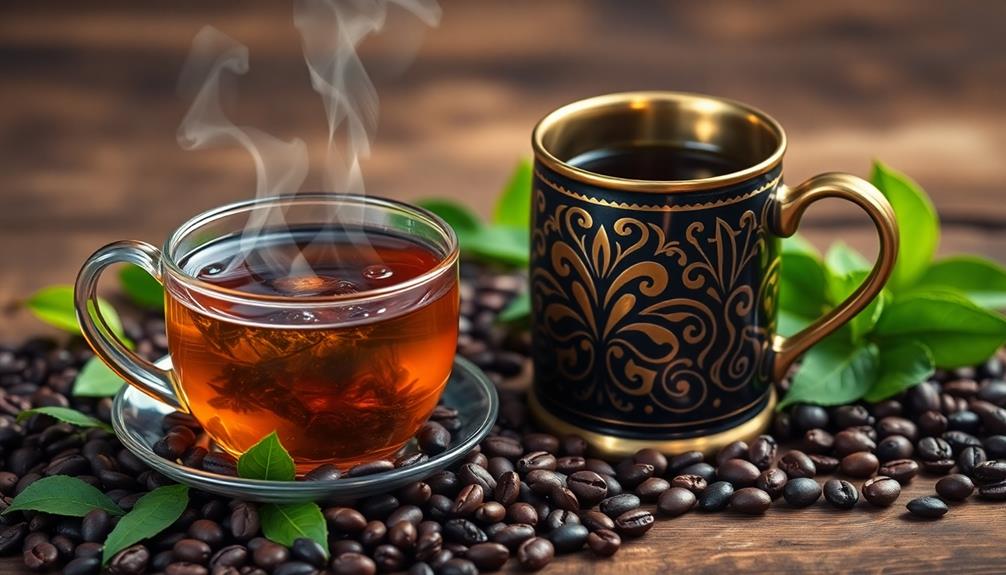
As coffee lovers seek healthier alternatives, matcha's rise signifies a broader shift in consumer preferences. This finely ground green tea is quickly becoming a staple in urban markets, particularly in cities like New York, where dedicated matcha cafes and menu items are popping up everywhere.
The increasing sales of matcha products reflect your growing interest in healthier choices, with consumers attracted to its sustained energy release and impressive health benefits, including high antioxidant content and lower acid reflux compared to coffee. Additionally, matcha contains vitamins and amino acids that can support overall wellness, much like celery juice and pregnancy, which offers unique health benefits as well.
You might also notice how the vibrant green color and aesthetic appeal of matcha drinks make them a favorite on social media, especially among fashion influencers. These visuals not only entice you but also promote the drink's lifestyle image.
Brands like MatchaBar and Panatea are seizing this opportunity by offering innovative products and educational resources on traditional preparation methods. They cater to your fast-paced lifestyle while also appealing to those of you who enjoy a more ritualistic experience.
This trend shows how matcha isn't just a drink—it's becoming a cultural phenomenon that reflects a growing demand for healthier, visually appealing options in your daily routine.
Embracing Tea Rituals and Practices
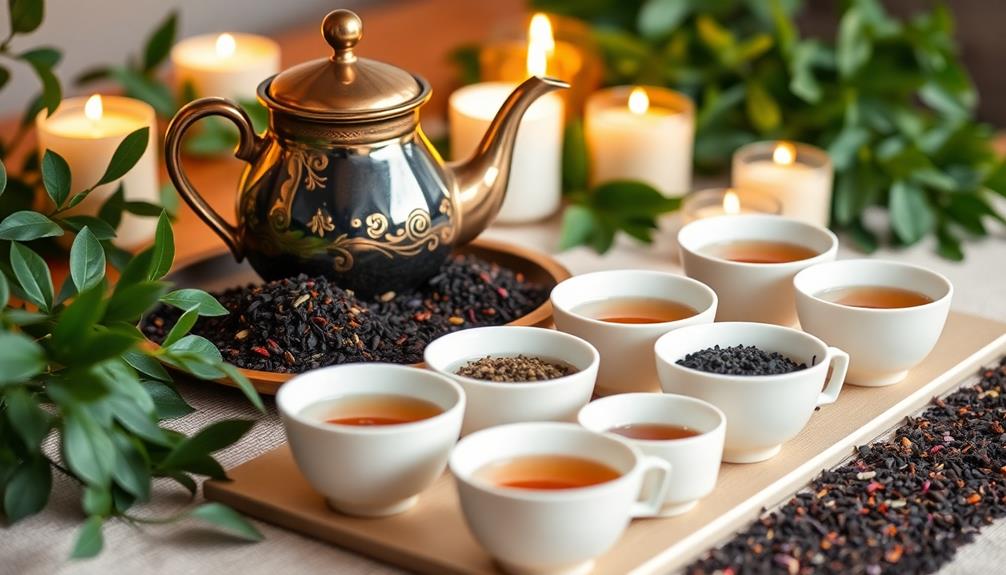
Embracing tea rituals can transform your daily beverage experience into a meaningful practice that fosters mindfulness and connection. By incorporating these rituals into your life, you can deepen your appreciation for tea and create moments of reflection.
For instance, understanding the influence of Zen Buddhism on tea ceremonies can enhance your experience even further, allowing you to appreciate the harmony and respect inherent in each ritual traditional tea ceremony.
Here are some ways to enhance your tea experience:
- Participate in a Japanese tea ceremony, where each step emphasizes mindfulness and artistry.
- Prepare a comforting cup of Indian chai, blending spices while sharing the experience with friends or family.
- Use traditional tools like a bamboo whisk for matcha, celebrating authenticity and enhancing flavor.
- Serve Moroccan mint tea as a symbol of hospitality, inviting connection and warmth into your gatherings.
Each of these practices invites you to slow down and savor the act of drinking tea, shifting your focus from mere consumption to a richer experience.
Engage more deeply with the flavors, aromas, and cultural significance of tea. By embracing these rituals, you'll not only enjoy your tea more but also foster a sense of community and mindfulness in your daily life.
Frequently Asked Questions
Why Did America Switch From Tea to Coffee?
You might say America traded tea for coffee to embrace a new identity. The revolt against British taxes sparked this change, as coffee became a symbol of freedom, energizing both soldiers and citizens alike.
Why Did British Switch From Coffee to Tea?
You'll find that Britons switched from coffee to tea due to patriotic sentiments after the Boston Tea Party, lower costs of tea, the rise of tea houses, and the East India Company's marketing efforts.
Why Do People Switch From Coffee to Tea?
You might find coffee's sharp kick jarring, while tea offers a gentle embrace. With its rich flavors, health benefits, and calming rituals, switching to tea invites a mindful moment, transforming your daily routine into a soothing experience.
What Was the Significance of People Switching From Alcohol to Coffee?
When people switched from alcohol to coffee, they embraced a more stimulating, productive social atmosphere. Coffeehouses became lively hubs for conversation, creativity, and intellectual exchange, fostering a healthier lifestyle and reshaping cultural norms.
Conclusion
As you sip your steaming cup of ancient tea, let the rich, earthy notes dance on your palate, whispering secrets of tradition and health. With each delicate brew, you're not just savoring a drink; you're embracing a world of flavor, culture, and ritual that coffee simply can't offer. So, why not trade in that bitter cup for a vibrant, soothing infusion? You might just find that this ancient elixir becomes your new favorite morning ritual, awakening your senses anew.
In the vast and diverse world of coffee, coffee alternatives, and tea, Olivia has found her calling. As an author and a dedicated coffee and tea aficionado, her work for Cappuccino Oracle reflects her profound love and understanding of the intricate complexities found within these beverages. Olivia’s passion for the subject serves as both a catalyst for her creativity and a connection point with her audience.
Olivia’s appreciation for coffee, coffee alternatives, and tea blossomed at an early age. She discovered that these beverages invigorated her senses and stimulated her creative spirit. From the nuanced flavors of single-origin roasts to the captivating narratives intertwined with coffee, coffee alternatives, and tea trade and culture, Olivia found an unlimited source of inspiration in her daily cup.
Her love for these beverages and her talent for storytelling eventually converged at Cappuccino Oracle. As an author, Olivia’s mission is to illuminate the intricate tapestry that makes up the world of coffee, coffee alternatives, and tea. Her articles span a diverse range of topics, encompassing everything from the unique flavors of different brews to the sociocultural history intertwined with their cultivation and consumption.
-

 Cappuccino Oracle Selected Reviews4 weeks ago
Cappuccino Oracle Selected Reviews4 weeks agoExperience the Warmth of Tanpopo Konditorei Café Munich
-

 Coffee Basics2 weeks ago
Coffee Basics2 weeks ago10 Potential Health Risks of Single-Serve Coffee Pods and How to Mitigate Them
-

 Coffee Basics2 weeks ago
Coffee Basics2 weeks agoCaffeine Content Comparison: Nespresso Vs. Traditional Coffee Vs. Energy Drinks
-

 Coffee Basics1 week ago
Coffee Basics1 week agoCelebrity Coffee Habits: Insights From TV and Movie Stars
-

 Coffee Basics2 weeks ago
Coffee Basics2 weeks agoSoft Drinks and Medical Tests: What You Need to Know
-

 Coffee Basics7 days ago
Coffee Basics7 days agoThe Impact of Coffee on Digestive Health: What Science Says
-
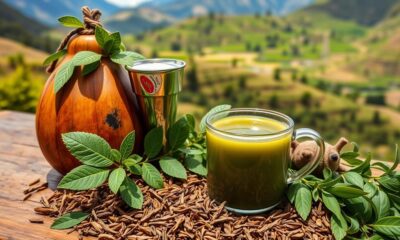
 Coffee Basics1 week ago
Coffee Basics1 week agoYerba Mate: The South American Superfood and Its Health Benefits
-

 Coffee Basics1 week ago
Coffee Basics1 week agoHerbal Teas for Every Occasion: From Relaxation to Romance





























